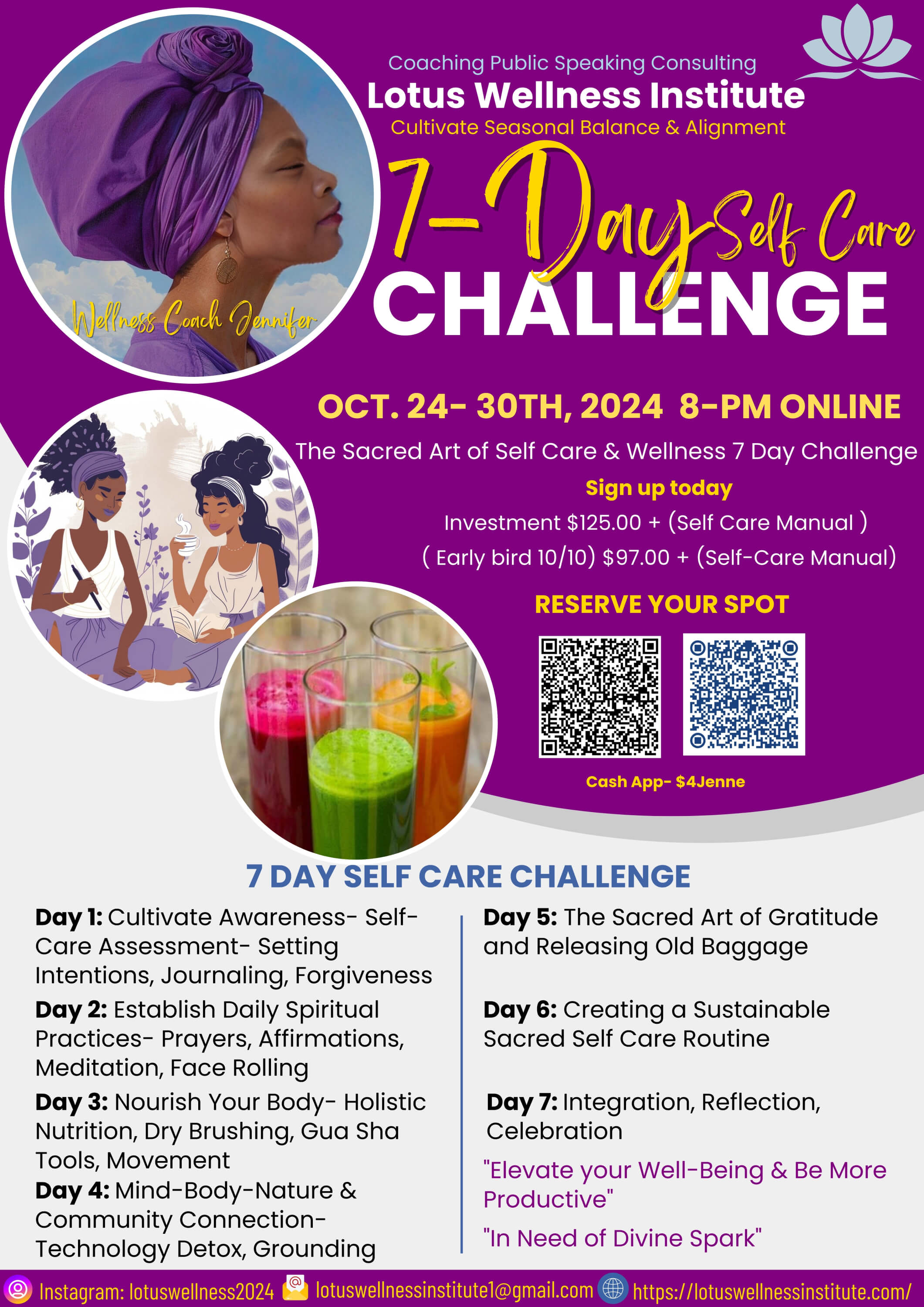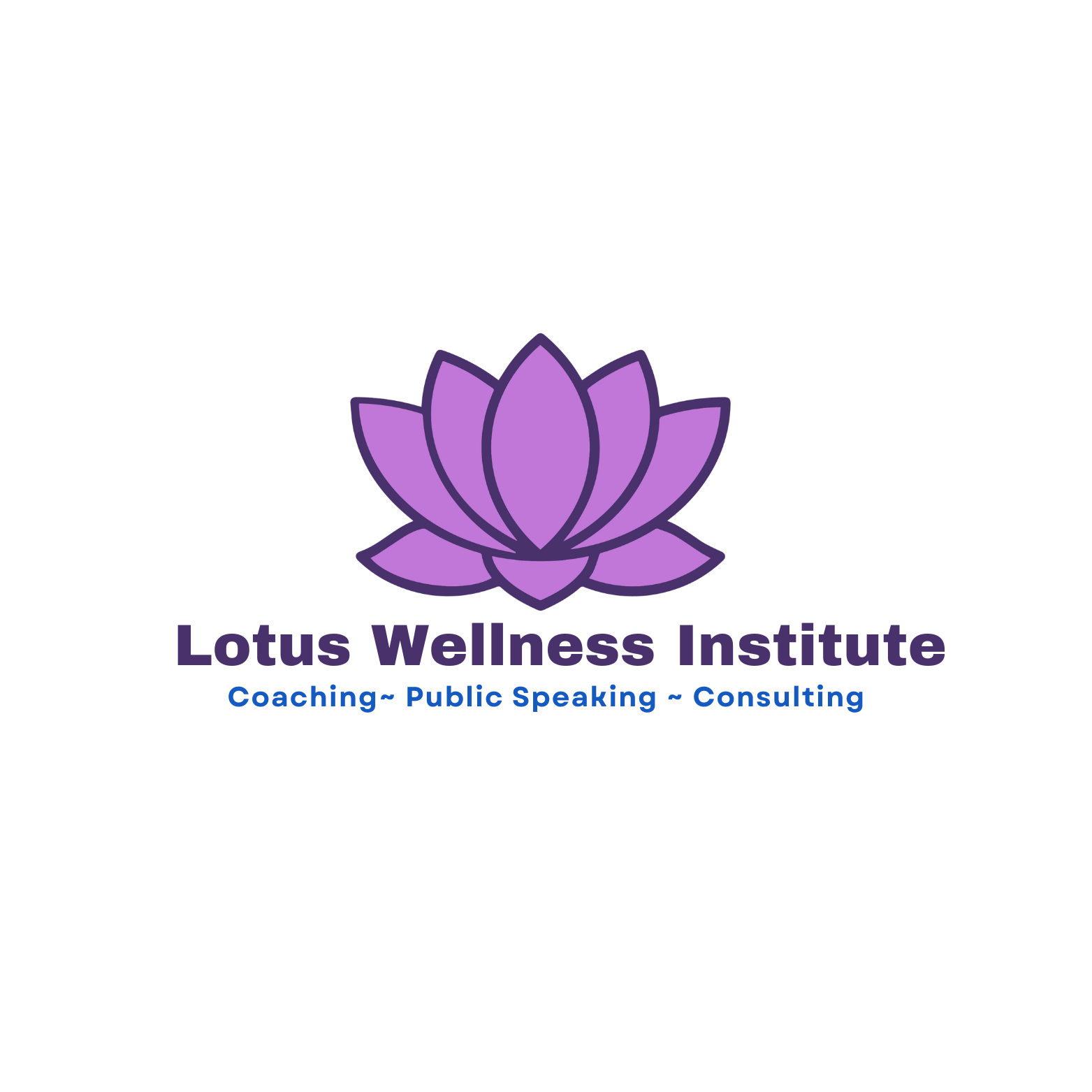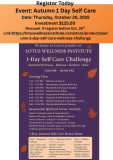
It is not to Late! Coach Jennifer invites you to join "The Sacred Art of Self-Care & Wellness 7-Day Challenge," a journey designed to holistically nurture your mind, body, and spirit. Together, with the support of a like-minded community, we'll work towards physical, emotional and spiritual wellness and upliftment, nourishing our souls in sync with the changing season.
Countdown to Wellness: Embrace the Start of "The Sacred Art of Self Care & Wellness 7 Day Online Challenge"!
Hello Beautiful People!
Are you ready to embark on a transformative journey that promises to recharge your body, reboot your spirit, and align your entire being with the enchanting energy of autumn? If your heart is whispering "yes," then Coach Jennifer's "The Sacred Art of Self Care & Wellness 7 Day Online Challenge" is your calling.
As the leaves transform and the crisp autumn air settles in, there's no better time to embrace change within ourselves. The fall season brings with it a natural opportunity for reflection and renewal. It's the ideal moment to step back and realign with our true selves.
Embracing self-care during the fall isn’t merely a fleeting endeavor; it’s a vital investment in your holistic health and spiritual fulfillment. As you engage with "The Sacred Art of Self-Care & Wellness 7-Day Challenge," remember that each step, small as it may seem, leads to profound personal growth and rejuvenation. Autumn is a time of beautiful transformation—both in nature and within ourselves. Let this challenge be your guide in rediscovering balance, nurturing your spirit, and setting the stage for a brighter, more aligned future. Join us in this sacred journey and witness the positive shifts unfold. We’re looking forward to walking this path of renewal with you,
What is a Self Care Challenge?
Imagine dedicating seven days solely to YOU. Picture immersing yourself in practices that rejuvenate, empower, and elevate your essence. A self-care challenge is an invitation to dive deep into ancient healing and holistic health practices, specifically designed to help you shed stress and embrace balance. It's about aligning perfectly with the divine timing of the autumn season, where transformation is nurtured and renewed energy is harvested.
Our Mission with the 7 Day Self Care & Wellness Challenge:
At the heart of this challenge is the mission to help you heal, grow, and move forward with renewed strength and joy. By nurturing self-love and resilience, you'll step into a future where balance and positivity are not just goals but a way of life.
Amazing Benefits of the 7 Day Challenge
1. Holistic Alignment & Rejuvenation: Step into a sanctuary of peace with daily wellness rituals that encompass emotional, physical, and spiritual dimensions. Experience stress melt away and find yourself in perfect harmony with the universe. Participate in a comprehensive approach that unites the physical, emotional, and spiritual aspects of well-being. As you engage in daily exercises and reflections, you’ll feel a harmonious alignment between your inner and outer worlds.
2. Community Connection: There's strength in numbers. Joining this challenge means embarking on a journey together. Share experiences, insights, and encouragement with fellow participants, creating a community that propels each member towards personal growth and transformation. Join a vibrant community of like-minded souls who, like you, are on a journey to empower themselves and uplift others. Share, learn, and grow together in a space infused with positivity and heartwarming connections.
3. Empowerment & Transformation: Discover tools and practices that instill self-love and self-empowerment in every fiber of your being. Leave this challenge not only transformed but with a lifelong guide to maintaining a balanced and flourishing life, both personally and professionally.
4. Seasonal Detox and Recharge: As nature prepares for winter, our bodies and spirits are ripe for detoxing and recharging. Through guided meditations, mindful practices, and wellness activities, this challenge encourages the shedding of what no longer serves you and the ignition of your inner divine spark.
What Can Participants Expect?
Across these seven days, Wellness Coach Jennifer will guide you through a series of live sessions, each crafted to align with the natural rhythms of autumn. Through ancient healing traditions, you'll explore stress reduction techniques and harmonious rituals that resonate with the grace of this season. Prepare to unlock the gates to holistic health, healing, growth, wellness, and self-empowerment as you honor your journey and align with divine energy—both within and beyond.
Your Self Care Journey Awaits You!
The 7-Day Self-Care challenge is more than just a weekly commitment—it's a transformative experience that taps into the rhythm of autumn, providing the necessary tools to detox your mind and body. You’ll receive daily guidance from Coach Jennifer and engage with a supportive group of individuals who share the same goals. Through this collective journey, you’ll embrace seasonal alignment that not only supports your current wellness goals but sets a robust foundation for the coming months.
It’s time to rise and shine, Ignite your inner light and embrace the vibrant opportunities that await during this transformative challenge. It's truly never been a better moment to invest in your well-being and share this joyful journey with others. Remember, you're not alone—Wellness Coach Jennifer goes live at 8 PM, ready to guide and inspire.
See you then, Beautiful Souls. Let's embark on this sacred journey
Keep it Beautiful

Wellness Coach Jennifer

Balancing Social Self-Care for Autumn Wellness:
As the vibrant hues of autumn leaves begin to fall, the season invites us to slow down and reflect on our wellness routines. For wellness coach Jennifer, this is the perfect time to introduce her upcoming "7 Self-Care, Wellness, and Spiritual Upliftment Challenge." Central to this challenge is the concept of social self-care—a vital component for holistic wellbeing that often gets overlooked. This blog will delve into the importance of social self-care, its benefits, and how to implement it effectively alongside spiritual wellness & upliftment, particularly during the autumn season.
Understanding Social Self-Care
Social self-care involves nurturing and maintaining healthy relationships and interactions with others. This aspect of self-care is not just about having a social life; it involves compassionately engaging with others, setting boundaries, and ensuring that our social interactions enhance our wellbeing rather than drain it. In today’s fast-paced world, the emphasis on productivity can overshadow the need for meaningful connections, making this an essential practice for achieving balance.
The Importance of Social Self-Care:
Social self-care is crucial for our mental, emotional, and even physical health. It provides a sense of belonging and community, which is fundamental to human nature. Positive social interactions can boost our mood, reduce stress levels, and even improve longevity by fostering a supportive network.
Three Benefits of Social Self-Care:
1. Emotional Resilience: Regular interaction with supportive and understanding friends or family can enhance emotional resilience, providing comfort and perspective during challenging times.
2. Enhanced Mental Health: Social self-care can decrease feelings of loneliness and depression. Positive social interactions release endorphins, creating a sense of happiness and reducing anxiety. This is also a great time to make sure we are a eating foods rich in vitamin C, B, and D.
3. Personal Growth: Engaging with diverse social groups opens the door to new perspectives, ideas, and knowledge, fostering personal growth and development. Great time to go within and to also expand your territory.
Implementing Social Self-Care and Spiritual Upliftment for Autumn
As the autumn season heralds introspection and change, it’s an opportune time to embrace both social self-care and spiritual upliftment. Here are a few methods to consider:
- Reconnect with Loved Ones: Arrange regular catch-ups, whether virtual or in-person, to nourish relationships. A cozy tea party or autumn walk can be great for bonding.
- Join Community Groups: Autumn brings various community activities, like harvest festivals and fairs. Engaging in these can expand your social circle and enhance your community connection.
- Spiritual Retreats or Wellness Workshops: Participate in retreats or workshops that focus on spiritual upliftment. Meditation, mindfulness, or yoga sessions tailored for the autumn season can align your energies with nature’s transition phase.
What’s Different About Autumn Self-Care?
Autumn is a transitional period that naturally encourages preparation for the introspection of winter. It demands a slightly different self-care approach:
- **Reflective Practices:** Use nature’s slowing rhythm to engage in more reflective and contemplative practices. Journaling or meditation might be particularly rewarding.
- Embracing Change: As nature lets go of what’s no longer needed, autumn self-care involves embracing change and releasing old habits or relationships that don’t serve you well. My Motto is "Change is Just Change" Use the Autumn to take the time to set up a self care and much needed wellness routine for yourself to help you move effortless to the next season!
In essence, social self-care is a powerful tool for enriching our lives. By nurturing our connections with others, we pave the way for emotional health, community support, and personal growth. Jennifer’s upcoming challenge beautifully coincides with autumn, a season ripe for reflection, reconnection, and spiritual upliftment.
By incorporating social self-care into your routine, particularly during autumn, you embrace the season’s energy of change and connection, setting a foundation for a more balanced and fulfilled life. So this autumn, let’s embark on this wellness journey together with Jennifer, revitalizing our spirits and strengthening our bonds to ensure a heartwarming transition into the cozy embrace of winter.
Get your warm teas, soups, and tonic !
Wellness
Keep it Nefer ( Beautiful)
Jennifer

Embrace Autumn: 3 Self-Care and Wellness Activities for Balance and be Intune with the Season!
TO Everything is a Season and Reason !
What are you main reason to practice Self Care & Wellness Techniques in the Autumn Season?
As the vibrant hues of summer fade into the warm tones of autumn, many find themselves swept up in the hustle and bustle that this season brings. Fall is a transitional period, not just for nature, but also for our bodies and minds. Understanding and aligning with these changes using traditional Chinese medicine and holistic spiritual practices can cultivate balance and prepare us for a successful season. Coach Jennifer’s upcoming 7-Day Self-Care Challenge is the perfect opportunity to immerse yourself in this transformative journey.
1. Embrace the Metal Element:
What to do now:
In Chinese medicine, autumn is associated with the metal element, which governs the lungs and large intestine. This is a time to focus on breathwork and decluttering both physically and mentally.
Why: it is Needed?
Breathwork enhances lung capacity and purifies our internal systems, mirroring the shedding process visible in nature during fall. Decluttering provides clarity and creates space for new opportunities and growth.
Seasonal Health Benefits:
- Improved respiratory health and emotional clarity.
- Letting go of what no longer serves, making room for fresh starts.
- Enhanced focus and reduced anxiety.
2. Nourish Your Mind and Body with Seasonal Foods:
What to do now: that its Autumn !
Incorporate seasonal, warming foods into your diet such as squash, sweet potatoes, and pears. These foods are believed to support digestion and nourish the body’s qi.
Why these techniques are Need doing this time!
As temperatures drop, our bodies require more warmth and nourishment. Seasonal foods not only provide essential nutrients but also align our internal energy with the external environment.
Seasonal & Health Benefits:
- Boosted immunity and energy levels.
- Balanced digestion and increased vitality.
- Harmonized body rhythms with nature’s cycle.
3. Spiritual Grounding Practices:
What to do now during this Autumn Season!
Engage in grounding spiritual practices like meditation, journaling, or walking in nature. Focus on gratitude and setting intentions for the rest of the year.
Why these practices are needed in the Autumn Season?
Autumn is a natural period for reflection and spiritual grounding. Taking time to connect with yourself and the earth helps cultivate inner peace and clear vision for the future.
Seasonal & Spiritual Benefits:
- Deepened self-awareness and spiritual connection.
- Increased mindfulness and present-moment living.
- Strengthened sense of purpose and clarity.
As we usher in the fall season, aligning with nature through traditional Chinese medicine and holistic practices lays a robust foundation for balance and success.
Coach Jennifer’s 7-Day Self-Care Challenge provides a structured and supportive way to implement these practices into your daily routine.
The transition into autumn can be a harmonizing and enriching experience. By embracing the metal element, nourishing with seasonal foods, and grounding spiritually, we invite balance and alignment into our lives. Take this season as an opportunity for personal growth and preparation for the future.
Join Coach Jennifer on this journey, and transform your fall into a time of reflection, clarity, and empowerment.
Get ready to transform, rejuvenate, and thrive this autumn! 🌟
Keep it Nefer ( Beautiful )
Wellness Coach Jennifer

In today's fast-paced world, it's easy to get caught up in the hustle and bustle of everyday life, neglecting our own needs in the process. As a result, self-care and self-love often take a backseat. However, prioritizing these aspects is essential for living a balanced and fulfilling life. In this blog, Coach Jennifer shares her insights on the importance of self-care, how to set up self-care boundaries, and a simple three-step plan to help you get started. Plus, don't miss the invitation to join Coach Jennifer's upcoming "7 Days The Sacred Art of Self-Care Challenge" that promises to kickstart your journey towards a more centered and joyful you.
Understanding Self-Care
Self-care is more than just bubble baths and spa days. While those activities can be a part of it, self-care encompasses a wide range of practices aimed at improving your mental, emotional, and physical well-being. It's about taking intentional actions to maintain a healthy relationship with yourself. By doing so, you not only improve your self-esteem, but also your ability to handle stress, and overall life satisfaction.
Setting Up Self-Care Boundaries
Establishing boundaries is crucial for effective self-care. Boundaries help ensure that you have the time and energy to focus on your needs without feeling guilty or selfish. Here are some tips on setting up self-care boundaries:
1. Identify Your Needs: Understand what you need to feel your best. This could be alone time, regular exercise, or time with loved ones.
2. Communicate Clearly: Let others know what your boundaries are. This allows them to respect your space and time.
3. Be Consistent: Stick to your boundaries even when it's difficult. This sets a precedent and teaches others to respect your limits.
Three Steps to Prioritize Self-Care and Self-Love
To incorporate self-care into your daily routine, follow these three simple steps:
1. Schedule "Me Time": Dedicate a specific time each day just for yourself. Whether it's 15 minutes or an hour, make sure it's non-negotiable. Use this time to do something you love or simply relax. One of my things to do is to go to the Spa at least once a month to recharge, and reboot. Walking in nature and hanging out with trees is another non -negotiable me time activity.
2. Practice Mindfulness: Mindfulness practices such as meditation, yoga, or even mindful walking can help you stay grounded and present. This reduces stress and increases your overall well-being.
3. Keep a Self-Care Journal: Write down your thoughts, feelings, and self-care activities. This helps you keep track of what works for you and what doesn't, making it easier to prioritize your well-being.
Prioritizing self-care and selflove is not an indulgence but a necessity. By understanding what self-care means, setting up boundaries, and following a structured approach, you can lead a balanced and fulfilling life. Don't let the pressures of daily life push you to neglect your needs.
Are you ready to take the next step in your self-care journey? If so, I invite you to register for Coach Jennifer's "7 Days The Sacred Art of Self-Care Challenge." This challenge is designed to help you establish a self-care routine that suits your lifestyle and improves your overall well-being. Join us and take the first step towards a healthier, happier you.
Go to Event page and Register and Reserve your Spot!
Remember, when you prioritize self-care and self-love, you are investing in the most important asset you have – yourself. Don't wait. Start today.
Warm regards, Keep it Nefer ( Beautiful)
Coach Jennifer
---

How To Nurture Your Well-Being in Autumn: A Guide to Seasonal Self-Care
Wellness ! To Everything is a Reason and a Season!
Welcome to Coach Jennifer's guide to seasonal self-care! As the vibrant greens of summer transition into the fiery hues of autumn, it's the perfect time to realign our self-care routines with the rhythms of nature. Embracing seasonal self-care not only uplifts our spirits but also harmonizes our mind, body, and soul with the natural world. In this blog, we'll explore the benefits of seasonal self-care, provide practical tips for autumn, and delve into ancient techniques for a holistic wellness journey.
4 Benefits of Seasonal Self-Care!
1. Enhanced Emotional Resilience: By aligning our practices with seasonal changes, we become more attuned to our environment, which fosters emotional resilience and helps us navigate life's various transitions with grace.
2. Boosted Immunity: Seasonal self-care often involves adapting our diets and routines to better suit the climate, which can strengthen our immune system and keep us healthy throughout the year.
3. Increased Mindfulness: Paying attention to the seasons and their impact on our well-being encourages mindfulness. This state of present awareness can reduce stress and increase overall satisfaction and happiness.
4. Balanced Energy Levels: Seasonal routines help us regulate our energy levels. This ensures we remain active and productive while also incorporating periods of rest and reflection as needed.
Simple Autumn Self-Care Tips
1. Nourishing Diet As the weather cools, focus on warm, nourishing foods like soups, stews, and root vegetables. Incorporating seasonal produce such as pumpkins, pears, figs, grapes, apples, squash, kale, collards, brown rice, quinoa, oats, millet, legumes, chickpeas, lentils, spinach, artichokes, yucca, taro, jimica, and other can boost your body's immune system and provide essential nutrients.
2. Mindful Movement: With the crisp autumn air, take your exercise outdoors. Nature walks, hikes, and yoga sessions surrounded by the changing leaves can invigorate your body and calm your mind.
3. Restorative Practices: Shorter days call for more rest. Establish calming evening routines with activities like a warm bath, reading, or meditation to ensure a good night’s sleep.
4. Gratitude Rituals: Autumn is a time of harvest and gratitude. Keep a gratitude journal, or set aside moments each day to reflect on what you’re thankful for. This can enhance your sense of abundance and positivity.
Ancient Techniques for Autumn Wellness
1. Ayurvedic Practices Ayurveda, the ancient Indian system of medicine, recommends incorporating warm, grounding foods and practices as Vata (air) dosha increases in autumn. Oil massages, particularly with sesame oil, can provide warmth and grounding.
2. Traditional Chinese Medicine (TCM): According to TCM, autumn is associated with the lungs and large intestine. Focus on breathing exercises, like Qi Gong or Tai Chi, to strengthen lung function and practicing letting go of negative emotions or clutter in life. The organs to focus on in the Fall/Autumn season is the lungs, large intestines', and nervous.
3. African and Ingenious Herbal Remedies: Use herbs such as mullein, rooibos, licorice, ginger, moringa, soursop, Irish moss, turmeric, and cinnamon to warm the body. Herbal teas not only provide comfort but also boost immunity and digestion- Spices that are in season for fall/autumn season - parsley, sage, rosemary, thyme, chives, lavender, cilantro, mint.
4. Spiritual Connection: Engage in spiritual self-care practices such as guided meditation, journaling, or connecting with a spiritual community. Autumn’s reflective nature is ideal for deepening your spiritual awareness and connection.
Summary
Seasonal self-care is a powerful way to align with nature, enhance our well-being, and prepare for the changing demands of life. By adopting these autumn-specific practices, you can nourish your body with warm, seasonal foods, engage in mindful movement, establish restorative routines, and cultivate gratitude. Ancient techniques from Ayurveda, Traditional Chinese and African Botanical Medicine, and herbal remedies provide additional tools to keep your body, mind, spirit, and soul in optimal harmony.
So, take a deep breath of the crisp autumn air, savor the beauty around you, and let Coach Jennifer guide you towards a balanced, vibrant season of self-care.
Wishing you a nurturing and soul-enriching autumn!
Warm regards, Keep it Nefer ( Beautiful)
Wellness Coach Jennifer










